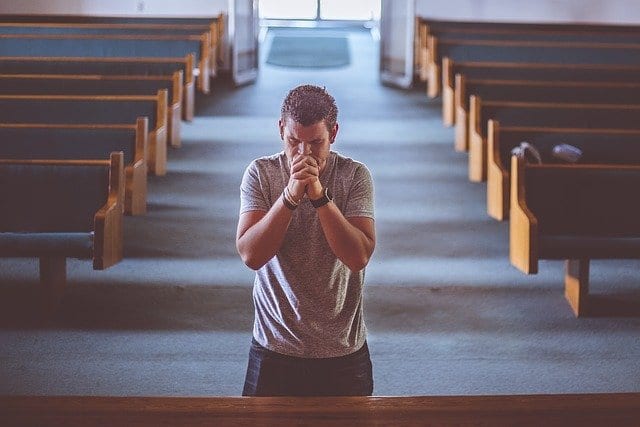
Fasting is a period when a person voluntarily or under duress refrains from food and possibly drink to varying degrees. Fasting is mandated in many religions such as spiritual renewal, cleansing process, penance and more. You can also fast for health reasons, sometimes at the request of a doctor, for example before certain types of operations, X-rays, or blood tests.
The tradition of fasting in religions
Fasting, whether voluntarily, for religious, ethical or health reasons, is abstaining from food for a certain period of time. It is longer than you normally do between meals. Fasting exists in almost all major religions. In several of the ancient mystery religions, fasting was a preparation for the encounter with the deity.
In many places, fasting has been discovered as a path to visions and other ecstatic experiences. Through fasting, it was believed that one would come into possession of magical powers. In this way, fasting became a form of protection against evil spirits. The custom of fasting in a home where someone died probably started to ward off evil spirits. The notion was that in this way evil spirits avoided entering the relatives of the dead in connection with their eating.
How to fast according to the Bible – Fasting in Christianity
The Bible first mentions fasting in Exodus. This is when Moses remains up on Sinai “for forty days and forty nights without eating and drinking” (Exodus 34:28). This is when he ascends to the Lord to receive the new stone tablets with the commandments of the law. Elijah fasted for just as long (1 Kings 19: 8). The prophet Daniel fasted before receiving his revelations (Dan. 9: 3, 10: 2). In times of trouble, all the people of Israel fasted to humble themselves before God and to show obedience to His will (Judges 20:26 and Jonah 3: 5).
In ancient Israel, fasting usually included the bright period of the day, from sunrise to the end of the day at sunset. For longer periods of fasting, fasting applied only during the day, and not at night. (This is also the case in Islam. During the Muslim fasting month of Ramadan, one does not eat anything. This is done as long as the sun is up. But one eats all the more abundantly and festively in the evenings. It is thus a fast that is not associated with any hardships).
How to fast according to the Bible – The Old Testament
The Old Testament law did not prescribe fasting more than on the Day of Atonement (Leviticus 16:29). But after the ionization of Jerusalem, four annual days of penance and fasting were arranged to commemorate the time in captivity (Zech. 7: 3 and 8:19). Later on, it became a pious rule to fast twice a week, without this being prescribed by law.
Jesus himself fasted 40 days in the wilderness in preparation for his mission (Matthew 4: 2). Although he did not directly urge his followers to fast, he took it for granted that he would do so after leaving them (Matthew 9).
He was also careful to point out to not act in a hypocritical way. He said if one fasts only to appear spiritual and pious in the eyes of other people (Matthew 6:16), it is wrong. Also, if one fast in hope that God will perceive one as righteous and good (Luke 18:12). and 1 Tim 4: 3), then it is also wrong.
Consequently, the young Christian congregation continued to adhere to the Jewish custom of fasting twice a week. But unlike the Jewish congregation, Wednesday and Friday were fasting days. Fasting also occurred at other crucial times, such as when missionaries were to be sent out (Acts 13: 3) and when new congregations were started (Acts 14:23). When someone was to be baptized, the baptismal candidate and his closest as well as the baptismal administrator often prepared by fasting. Paul also says that he fasted (2 Corinthians 6: 5 and 11:27).
How to fast according to the Bible – The rules
Eventually, a number of fasting rules arose within the church. Fasting was seen as a way to atone for sin and as a preparation for prayer. It was also seen as a way to show God his faith and as an exercise in renunciation. It was also considered a praiseworthy method of obtaining resources to provide food for the poor. From about the year 200, it was common for those who were to be baptized at Easter to prepare by fasting. Around the year 400, it was common Christian custom to observe a 40-day fast in connection with Jesus’ 40-day fast and the 40-year desert pilgrimage of the Israelites.
These different customs developed since the Lent of the church year. The oldest Easter fast included two days immediately before Easter. Since fasting was never on Sundays, the first day of Lent (Ash Wednesday) fell 46 days before Easter, and then Lent lasted until Maundy Thursday.
The Christian fast generally means a reduced food intake but also that one abstains from meat. Within the Catholic Church, food is limited to a main meal of the day, and by the way only lighter meals morning and evening.
Within the Orthodox Church, fasting means giving up all animal products (fish, milk, butter, cheese, eggs, etc.). There you have fasting rules for Wednesdays and Fridays (just like the original church), Lent, and certain other times.
How to fast according to the Bible – The Protestant Churches
Within the Protestant churches, on the other hand, fasting does not occur in the same way. Lent Sunday has come to be seen as the beginning of Lent, but the practice of fasting in the literal sense has almost completely disappeared. Fasting is simply not something that is prescribed. It is not considered in itself to be something “religious” or to have any spiritual value of its own.
On the other hand, fasting is considered a “tool”. Among other things, it helps us to gain control over our body and the body’s demands. Luther, for example, recommended fasting as a way to curb sexuality and other carnal desires. But above all, fasting aims to bring us closer to God by emphasizing our own fragility and weakness as physical human beings.

Fasting can also be a way to focus our thoughts. By setting aside our bodily needs, we can concentrate entirely on our contact with God. The only “nourishment” we receive during fasting is of the spiritual kind.
When Jesus finished his 40-day fast in the wilderness, he was extremely hungry. It was then that Satan tried to persuade him to satisfy the craving for food and the satisfaction of his physical needs (Matthew 4: 1-3). Jesus’ answer was that man should not “live by bread alone, but by every word that proceeds from the mouth of God” (Matthew 4: 4).
That is what hunger during Lent should teach us to realize. Physical food is not everything. The spiritual food that truly gives us life – and ultimately eternal life – we receive by humbly seeking and obeying God. When God gave the Israelites manna to eat during the wilderness trek, it was like an unspoken prophecy. Prophecy about the real “bread of life” that would come from heaven a few thousand years later.
Consequently, fasting helps us to realize how little we can do without God’s help, without God’s power, God’s spirit. That is why Jesus emphasized that his followers should not fast to demonstrate their righteousness to others. Or to appear pious and holy in the eyes of others. B ut to do so privately and in humility:
“When you fast, do not look as gloomy as the hypocrites. Father, who sees in the hidden, rewards you “ (Matthew 6: 16-18).
However, we have misunderstood the whole thing if we fast in an attempt to force or persuade God to do something. The main purpose of fasting is to seek God and His will in our lives (Ezra 8:21), not to try to force on God our will (Isa. 58: 4 and James 4: 3). Our attitude toward the Father should be the same as Jesus’ attitude when he prayed to God:
“Let your will be done, not mine “ (Luke 22:42)
Conclusion
No external manifestations – no rituals, no services or hymns or beautiful words – are worth anything in God’s eyes if we do not follow God’s will. We must truly love our neighbor as ourselves and let it be expressed in concrete action. One can say that for a Christian, fasting is not something one does out of any religious compulsion, because religion prescribes it. But many have discovered the value of fasting as part of the quest to draw closer to God. And, to seek God’s will with their lives. Also, it is to humbly learn and realize even more clearly that it is ultimately He who gives us life. He gives us all that is required so that we can live.


